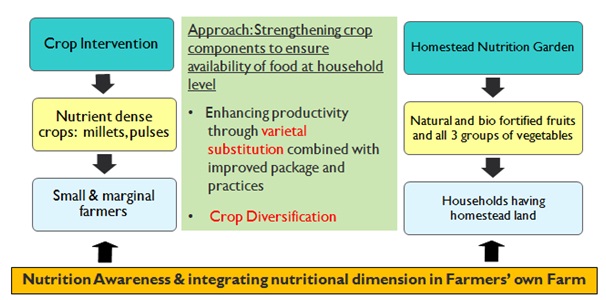Farming system for nutrition
A feasibility study of Farming System for Nutrition intervention in India
The Farming System for Nutrition (FSN) study led by the M.S. Swaminathan Research Foundation (MSSRF) was a feasibility study to gather evidence that agricultural interventions can be pro-nutrition. The approach envisaged the introduction of agricultural remedies to the nutritional maladies prevailing in an area through mainstreaming nutritional criteria in the selection of the components of a farming system involving crops, nutrition garden of fruits and vegetables and animal husbandry components like poultry or fishery, accompanied by nutrition awareness. The overarching aim of the study was to demonstrate feasibility of a farming systems approach to improve dietary diversity at household level as the first step to better nutrition outcomes.
The study was conducted in a core set of seven villages (658 households with population of 2,845) in Koraput district of Odisha state and five villages (556 households with population of 2,254) in Wardha district in Maharashtra state. Baseline survey in 2014 reported high levels of undernutrition, vitamin A deficiency and iron deficiency anaemia among children <5 years of age as well as high prevalence of chronic energy deficiency among adults and anaemia among women and adolescent girls at both the study sites. Agriculture was the primary livelihood and households were found to have cereal dominated diets with average daily consumption of all other food groups below the recommended daily intake level, indicating low dietary diversity.
The findings provided a basis for the FSN design to focus on diversifying household food and diets for better nutrition and health by introducing production diversity. The thrust of the interventions was on increasing the area and availability of nutrient dense crops, viz. millets and pulses and fruits and vegetables. Interventions included introduction of improved/ biofortified varieties of cereals, millets and pulses, encouraging intercropping and double cropping, and recommending the package of practices to be followed; promoting nutrition gardens of natural and biofortified fruits and all the three groups of vegetables (leafy vegetables, roots and tubers and other vegetables); and increasing access to animal source foods, viz. poultry in Wardha and fishery in Koraput. Training was imparted on the package of practices to be followed including seed and post harvest management. Nutrition awareness was a core activity targeting all age groups and gender. Besides one to one interaction, programmes were organised in schools targeting school children and at ICDS Centres targeting adolescent girls and women and in the village as a whole to observe days like World Food Day; further men and women were selected from each village in a participatory manner and capacitated to become ‘Community Nutrition Resource Persons’ and spread the message of leveraging agriculture for nutrition. The study therefore examined the effectiveness of multi-sectoral approaches for improved dietary diversity based on both food (crop and animal) and non-food (nutrition education) factors.
An endline survey was conducted in late 2017 taking a sample of 190 households from each study area. Comparison was done with the same set of 190 households at baseline. The endline survey revealed crop diversification at the field level and greater availability of nutrient dense crops. Improvement in household dietary diversity was reflected in increased number of food groups in the diet, consumption of all three groups of vegetables, increased frequency of consumption and increased average intake of the food consumed. Since 2017, FSN farmers – both men and women have become spokespersons contributing to the uptake of several interventions at the grassroots level. The approach has been accepted by farmers in 15 other villages in Wardha and 18 other villages in Koraput. An external and internal qualitative evaluation was conducted in 2018 to understand the impact of nutrition awareness under FSN in the study locations. The external evaluation showed that the Community Hunger Fighters (CHF) approach as a part of nutrition awareness strategy is complementary to the basic conceptualisation of FSN action research. Such human interface contributes to the sustainable outcomes, not only for research but also for the community. The nutrition awareness process report on Community hunger fighters: an adult literacy programme was developed to document the implementation of CHF approach and impact of the same on the community.
Several measures were initiated under the study for ensuring sustainability of the approach after the study period, like introducing farmers to triple layered polythene bags for safe storage of the seeds, establishing community seed banks to ensure timely availability of seeds, linking farmers with seed suppliers and involving the village Panchayat for community ownership; millet and dal processing mills operated by farmers’ groups have been established in the villages in Koraput and the farmers linked with an existing farmers’ federation.
The study is perhaps one of the first in designing a system-wide farming intervention with nutrition focus to enhance dietary diversity of households primarily involved in agriculture and allied activities; the evidence generated through this study could provide a framework for designing nutrition sensitive farming systems in different agro-ecological zones of the country and the region. Advocacy efforts at policy level have been an ongoing practice and some evidence of influence is beginning to emerge. Further advocacy for the FSN concept is supported by Tata Trusts.
Major FSN interventions in land holding farming households








